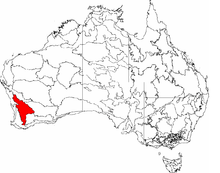Southwest Australia savanna



Southwest Australia savanna is an ecoregion in Western Australia.[1]
Location and description
This dry region is a belt between the Mediterranean climate of the southwest corner and the semi-arid sandplains inland and to the north. Much of the area is now converted to wheat growing.The latitude of this region is 8° to 20° on the equator.
Flora
Part of the biodiversity hotspot of Southwest Australia this region has been defined by the World Wide Fund for Nature and contains the Interim Biogeographic Regionalisation for Australia (IBRA) regions of the Geraldton Sandplains, Avon Wheatbelt, and Yalgoo.[2]
The original habitat consists of savanna dotted with eucalyptus woodland, mallee woodlands and shrublands and heath. Although in the more fertile southern areas this has now mostly been converted to wheatfields more original savanna remains in the north of the region where there are more acacia trees than eucalyptus. Plants of the region include many wildflowers and trees including the scented Acacia rostellifera. The best-preserved area of original habitat is found in and around the multi-coloured sandstone gorges of Kalbarri National Park on the Murchison River.
Fauna
Birds of the area include the emu, although this has been hunted as a pest by the wheat-growing community, and the honey-eating Western Spinebill. Mammals include the Honey Possum and the Southwestern Pygmy Possum, both of which feed on nectar from the wildflowers.
References
- ↑ C.Michael Hogan & World Wildlife Fund. 2012.Southwest Australia savanna. ed. P.Saundry. Encyclopedia of Earth. National Council for Science and the Environment. Washington DC
- ↑ "Southwest Australia savanna". Terrestrial Ecoregions. World Wildlife Fund.